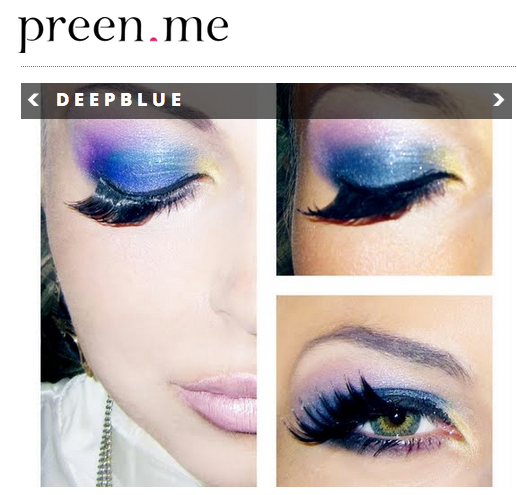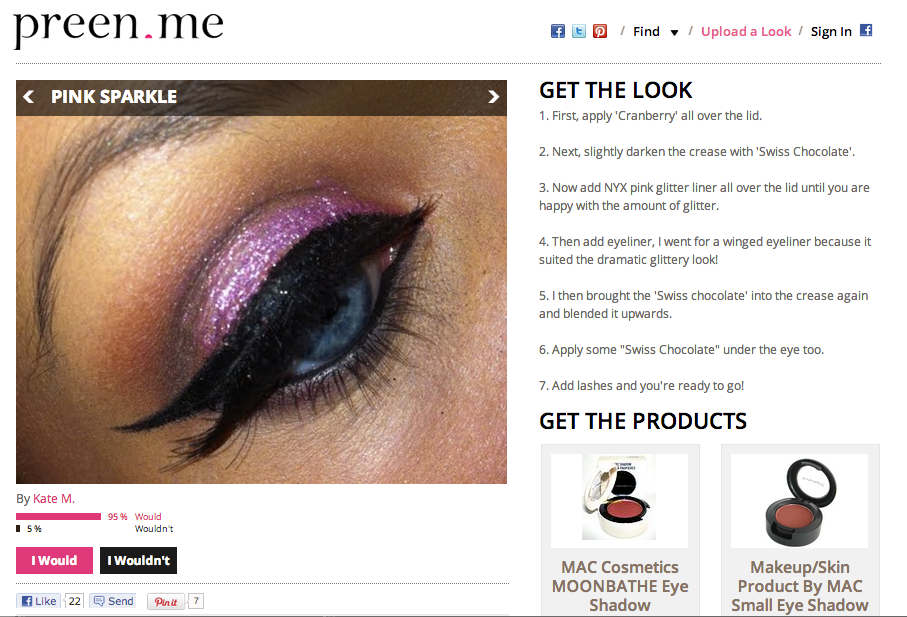Preen.me, a Tel Aviv-based social beauty startup, is today announcing having closed on a healthy $800,000 round of seed funding led by Genesis Partners. The round also saw participation from Li Ka-Shing’s Horizons Ventures as well as individual investor Oren Zeev. First launched as a Facebook fan community a year ago, then later expanding into an online website for beauty and makeup tips and how to’s, the plan going forward is to expand the service into personalized recommendations and price comparisons. What makes Preen.me interesting, however, is how it plans to do that.
Currently, the Preen.me website appears to mainly be a place for makeup and beauty ideas, but that will change in time. In the future, the goal is to allow users to find out what the top products are in any category based on the recommendations of those with similar profiles. For example, you’ll be able to tell Preen.me that you’re between 25 and 35 years old, have combination skin and live in a humid climate, and it will return a list of the top moisturizers women like you recommend. Essentially, it’s a big data play built on top of crowdsourced user recommendations.
Co-founder and CEO Tamar Yaniv’s background revolved around data. In her previous roles in operations and marketing at (non-beauty focused) companies like PokerStars and bwin, “metrics, analysis and numbers were like bread-and-butter to me,” she says. But Yaniv says she was inspired to create Preen.me after running into the same problem she now hopes to solve.
“The inspiration was very simple – I couldn’t find a moisturizer,” she explains. She says that she had been looking for the right one for years, and was never happy with her selection. “I live on the web,” she thought to herself. “I’ll just spend a little bit of time researching it, and I’ll figure it out and I’ll get the right product.” Three days later, she was still researching it and still had no confidence that she knew what to buy. “That’s when I realized that there are no resources, online or offline, that are going to tell you what’s going to work for you for your very specific profile,” Yaniv says.
 That’s not entirely true, of course. As a Clinique user, I know that I can walk up the counter and get a consultation that leads to a very personalized set of recommendations. But the difference is that with Preen.me’s vision, its recommendations would be across brands, and at all price points. They would also be based on the crowdsourced data from other users, as opposed to a single brand’s idea of what’s best.
That’s not entirely true, of course. As a Clinique user, I know that I can walk up the counter and get a consultation that leads to a very personalized set of recommendations. But the difference is that with Preen.me’s vision, its recommendations would be across brands, and at all price points. They would also be based on the crowdsourced data from other users, as opposed to a single brand’s idea of what’s best.
Preen.me is still building up to that more complete vision – its website was only launched in June and is still a fairly simple beauty tips site. Currently, its Facebook page has over 180,000 fans, but the company isn’t disclosing website visits, saying only that uniques are in the “six figures.” However, engagement is high, Yaniv tells us, with users performing around 40 interactions (generally recommendations as to “would try” or “wouldn’t try” something) per week. For now, the company works off affiliate advertising, and thinks that advertising and sponsorship will make sense in the immediate future. Longer term, however, the plan is to develop a closer relationship with brands.
Based in Tel Aviv, and supported by Upwest Labs in Palo Alto, the company was co-founded by COO Haggai Klorman-Eraqi and CTO Nitzan Volman, and is now a team of eight. With the new funding, Preen.me is planning on hiring developers and will relocate the business to New York in the next 12 months.
There are a few other notable beauty startups out there, including subscription commerce site Birchbox, makeup and clothing recommendations site Plum Perfect, and perhaps Preen.me’s closest competitor Beautylish, which all are moving into the beauty products space in some way, shape, or form. While all are attempting declutter the beauty space in new ways, Yaniv notes that Beautylish expanded from a community to a user-generated content (UGC) site, but for Preen.me, UGC is a “means to an end, not an end itself.”































Comment